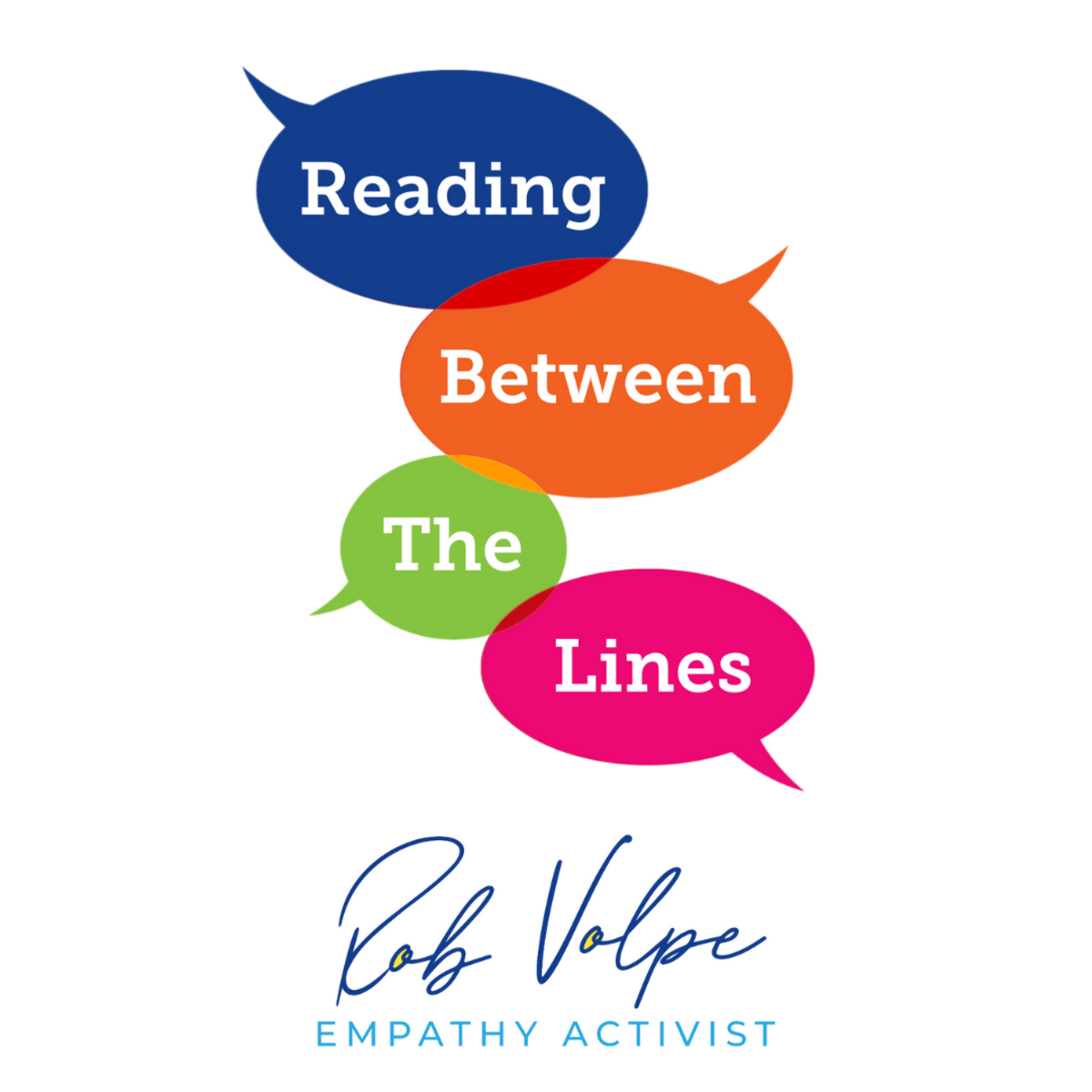Happy Saturday!
I’d like to take a moment to say thank you for the comments, thoughts and shares you provided in response to the last newsletter, How Empathy Works in Times of War and Terror.
My goal is that this newsletter serves not only as a means of sharing my thoughts and insights, but also as a platform to initiate meaningful discussions within this community. Please know that my inbox is always open. I look forward to more great conversations and questions with all of you.
Welcome to all the new members of the community and a quick reminder of what you can expect from me in each edition of this newsletter …
My thinking is here in the newsletter. Links are for diving deeper.
I strive to deliver ‘news you can use’.
I also share insights into human behavior and topics I’m thinking about.
I include amusing or interesting “slice of life” moments.
The Q&A feature is based on questions that come up in conversation - please send me yours!
I’d like to hear your thoughts- on the newsletter itself, on empathy in action, or another topic that’s on your mind. You can ‘reply’ to this email or reach out directly to: [email protected]
Curiosity Takes a Holiday
I find even the most unplugged, turn-my-brain-off vacation can be made better when I remember to pack curiosity and empathy into my carry-on (because I don’t want it to end up in lost luggage).
After our recent vacation traveling around Portugal, visiting Seville and hanging out in London, I noticed how often I was having to use empathy and stay curious to continue to enjoy the holiday.
Here are a few situations and scenarios that came up for me and how I handled them…
Exploring a New Culture
I remember in the first few weeks during my junior year abroad in London I overheard one my Syracuse University classmates crying on the phone, complaining through tears to her parents about how strange everything was in London compared to the US and how much she didn’t like it and wanted to come home. I was surprised because I was finding the differences fascinating and refreshing. That simple shift in mindset from otherness to curiosity about differences made a difference in how we were receiving the experience.
Jump ahead to last month in Portugal and I found myself bombarded with opportunities to turn judgment into curiosity - from wondering why the sidewalks are made of slick tiny cubes of stone to why people would want to eat fish with the heads still on to why Portugal’s role in slavery wasn’t more fully recognized to my ultimate question - why would people want to visit chapels made with human bones???
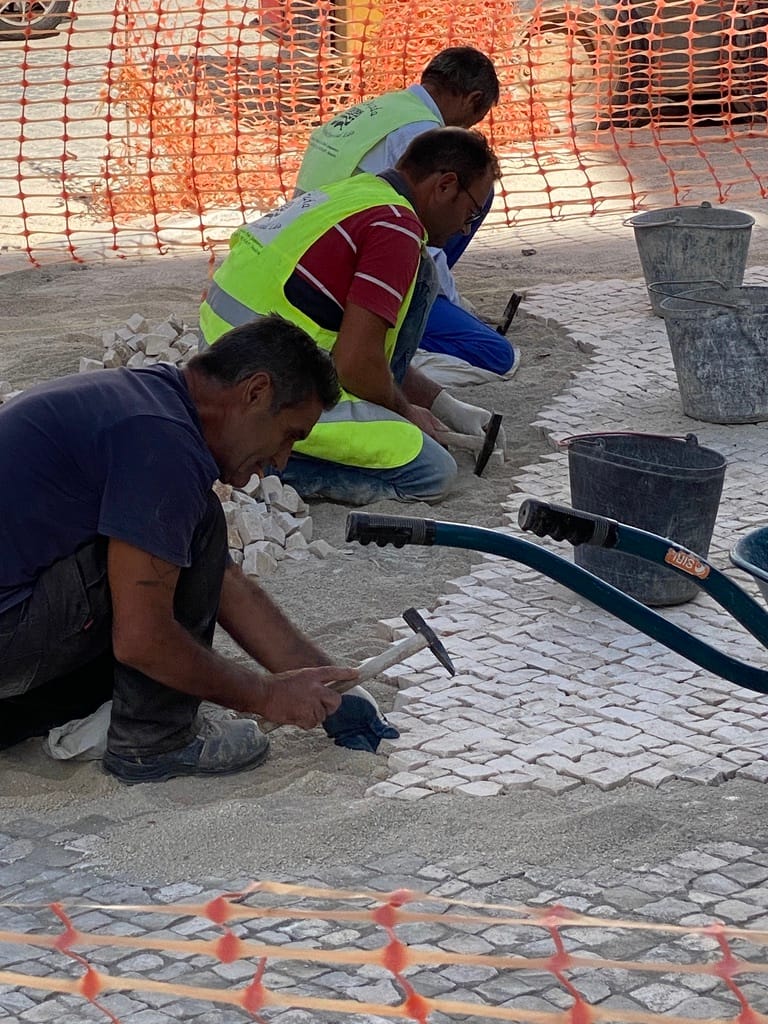
Calceteiros in Lisbon relaying a sidewalk during our visit.
The more I travel and meet people in different places, the less I have to battle with this transition but it still does come up, particularly when it “punches a button” for me like a personal peeve such as staring at fish heads or the more serious societal injustice like the inhumanity of slavery.
Depending on the amount of judgment that was coming up, I could either decide to let it go - don’t like fish heads, don’t order the fish with the heads - or with slavery or the bone chapels, I doubled down on my curiosity and my Google skills to learn more about the history. Doing so gave me greater context into the culture and history of the country and how the government and society reconciles the past in the present.

Charles stepping into the Bone Chapel in Campo Maior, Portugal. The monks wanted people to have a place to reflect on the after life and how we all are the same when it’s all said and done.
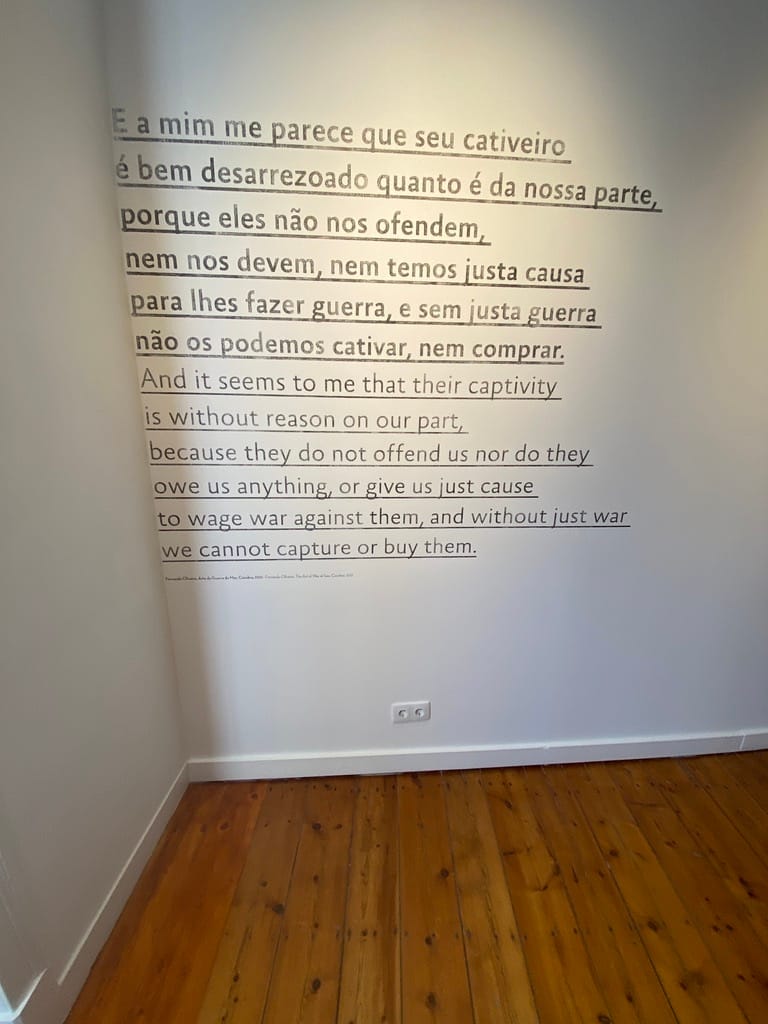
Lagos, a port town in the Algarve region in Portugal has a modest museum dedicated to Portugal’s story of slavery and the enslaved Africans who transited Lagos to the Americas. This quote is from Fernando Oliveira’s The Art of War at Sea, Coimbra, 1555.
I haven’t remained fully incurious about the fish heads. A few years ago visiting a friend on the Mediterranean coast of Spain we got into a conversation about what’s appetizing about fish heads. I don’t remember all the details because having my food staring at me still bothers me but I did lean into my curiosity to ask the question a different way.
As for the classmate in London 34 years ago, something remarkable happened. By the end of the first semester she had totally transformed, embracing traveling in Europe and living in London, she began to emerge as more of what I would describe as a citizen of the world. She ended up staying the full year and was open minded and accepting of difference instead of finding it strange and off-putting.
Traveling with Friends
Nothing tests friendship like traveling together. From handling delays to how they engage with customer service to preferences on dinner and nights out, if the group isn’t aligned or at least willing to let everyone do their own thing, it can be painful.
For this trip, our friends from the UK, fondly known as The Jameses, joined us for ten days as we drove around Portugal and over to Seville. We had traveled together before and visited each others homes over 10 years of friendship, so seeing five cities in ten days with me behind the wheel of a standard (stick shift) doesn’t seem too risky does it???

Cheers to a successful first day together in Porto! Great views of the Duoro River and Porto from The Yeatman hotel.
When traveling with friends or even with a romantic partner in those tender early days of romance, how you travel together can be a relationship killer. While you don’t have to be in sync all the time, using a little empathy and clear communication can help get through some rough patches…
Like when I had trouble getting the car in gear on a switchback turn on a narrow road on a steep hill in the Duoro Valley. Once we got to the top, there was understanding and not too much ribbing about the challenge of the situation in a strange vehicle.
Or when work took one of us away from the group, I was very aware of the shift in energy coming from the work situation. It made me mindful of the countless times I was “working” on vacation and how disruptive that must have been for Charles and others traveling with me.
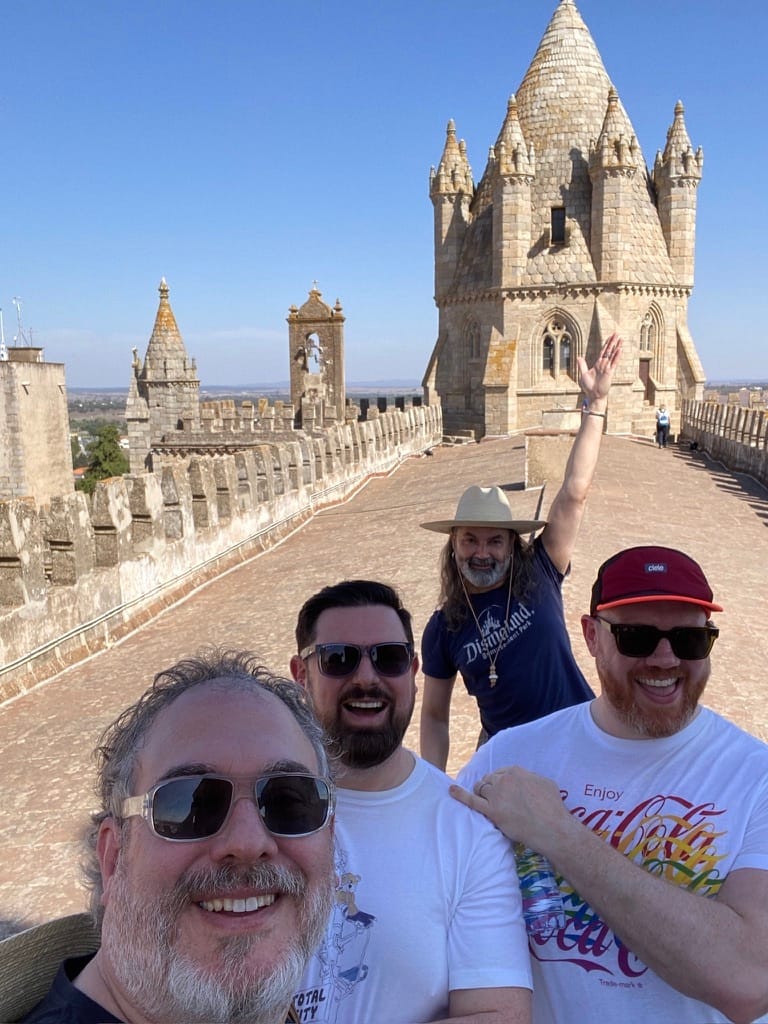
Atop the Se Cathedral in Evora, a UNESCO World Heritage site
We understood when someone wanted or needed to do something different and used that understanding (empathy) to determine how we could meet everyone’s needs. Sometimes that meant splitting up or someone staying behind and we were ok with that. Breaking apart and coming back together at a meal or in the car gave us new stories to share.
And all my travel companions were very understanding as my curiosity with the Bone Chapels grew and I kept finding subsequent chapels on our route to visit. (There are six or seven in Portugal and while they are all made with bones, the designs are different as chapels go.)
I try to keep in mind that everyone in my group has their own interests and travel practices and preferences. I figure out which of my interests are most important in terms of what I want to see or experience, and am willing to compromise so we all have the best trip possible.

Exploring the Bull Ring in Seville
The real test is at the end of the trip and the question of if we’d do it again or where to next. I’m happy to report we’re in discussions…
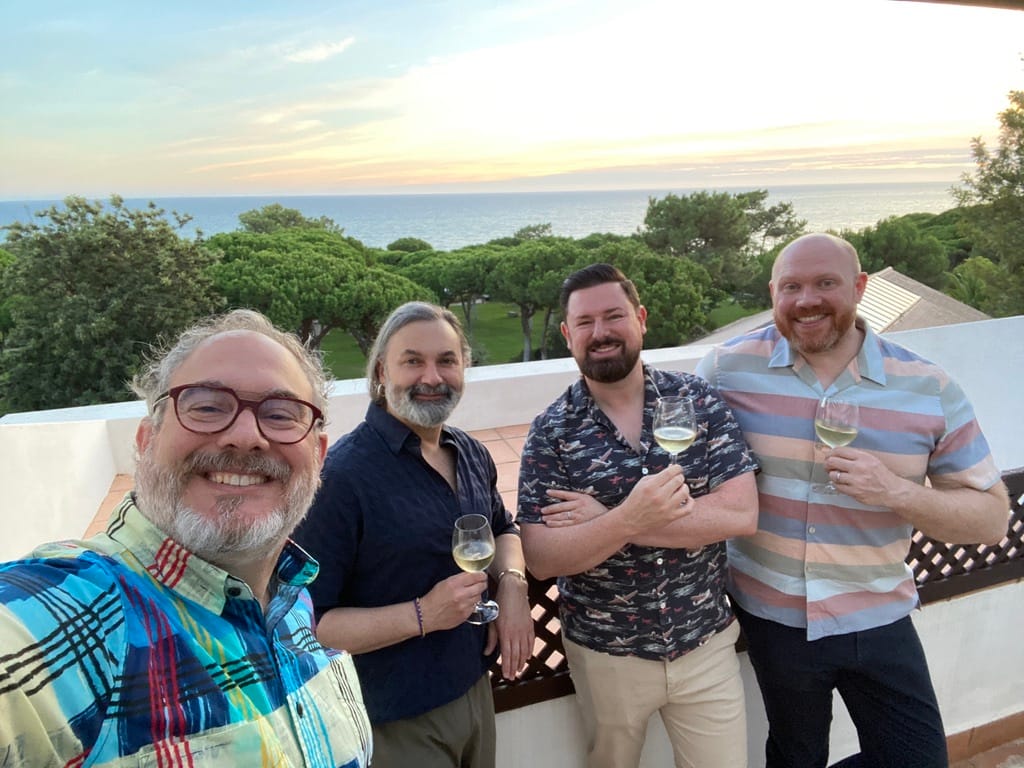
Cheers to a fun trip! Where to next???
Happy Staff Make Happy Guests
Having worked as a cater waiter in college and doing customer service, I have a good amount of empathy built up with people in service roles in general. It can be thankless and stressful depending on the customers and the management you are working for. What I have noticed generally is that when the employees are happy they do more to make the customer happy. From a business perspective you want that as it will lead to an increase in business over time as well as less turnover which also drains a company’s resources.
Toward the end of our time in Portugal we were in the Algarve on the southern coast. It was beautiful and we were at a resort that is part of Marriott’s Luxury Collection. We’ve been fortunate to have the resources to stay at these types of properties in the past so had a sense of what to expect.
What we didn’t expect was the transactional nature of the team working the breakfast buffet. Instead of smiles and even recognition of familiarity as we stayed nearly a week at this property, we got a lot of unemotional reactions from the wait staff.
And then we looked around and noticed that the guests looked kind of glum, even though they were in a beautiful setting with a bounty of food awaiting them.

A pine tree clings to the cliff side at the resort we stayed at in the Algarve
On one of our last mornings it clicked. One of the senior staff who had helped seat us the past several days did not fit the mold. She was smiling, her eyes displayed a recognition that she had seen us before, she asked us how we were. She put a smile on our face.
What was wrong with her? On our last morning, we asked. She said she was a full time Marriott employee and had the training so understood what was expected. Most of the staff we interacted with were temp workers who only come in for their 4-hour service shift and then leave. No time for training or tips on best practices.
It got me thinking about the cycle of glum staff serving grumpy guests who aren’t doing anything to help the staff break out of being so neutral in their service, which doesn’t help snap the guests out of their state of mind and the cycle repeats itself. It doesn’t lend itself to a great experience. The same is true regardless of the business you are running. If you have clients, customers or consumers, service with a smile goes a long way.
A challenge employees are facing though is the mental health crisis that’s going on. My friend Jen Marr recently shared this post on LinkedIn stating that 81% of employees report facing some form of mental health crisis or burnout and 68% say their work has been impacted. This isn’t just a white collar problem, it hits the service industry as well.
When I’m faced with bad service, regardless of where in the world I am, I try to take a curious breath to make space to respond constructively and engage positively. That gives me opportunity to evaluate the situation. Hopefully we can get to a positive place. Sometimes it doesn’t but I think it’s best to try than merely react with anger which upsets the situation.
Don’t Forget #1
While I’m busy having empathy with others while traveling, I’ve come to realize the importance of having empathy with yourself. What does that mean? For me, it’s self-awareness of what I’m needing and how I’m feeling in the moment. I might be the one to say to the group I want to go hang by the pool and read a book because I recognize I need some downtime to process all the sights I’ve taken in. That self-empathy can also come in handy when you are planning the trip. Regardless of whether you are choosing a vacation to tune in or tune out, make sure you turn up the lights on your own needs to get the most out of the experience.
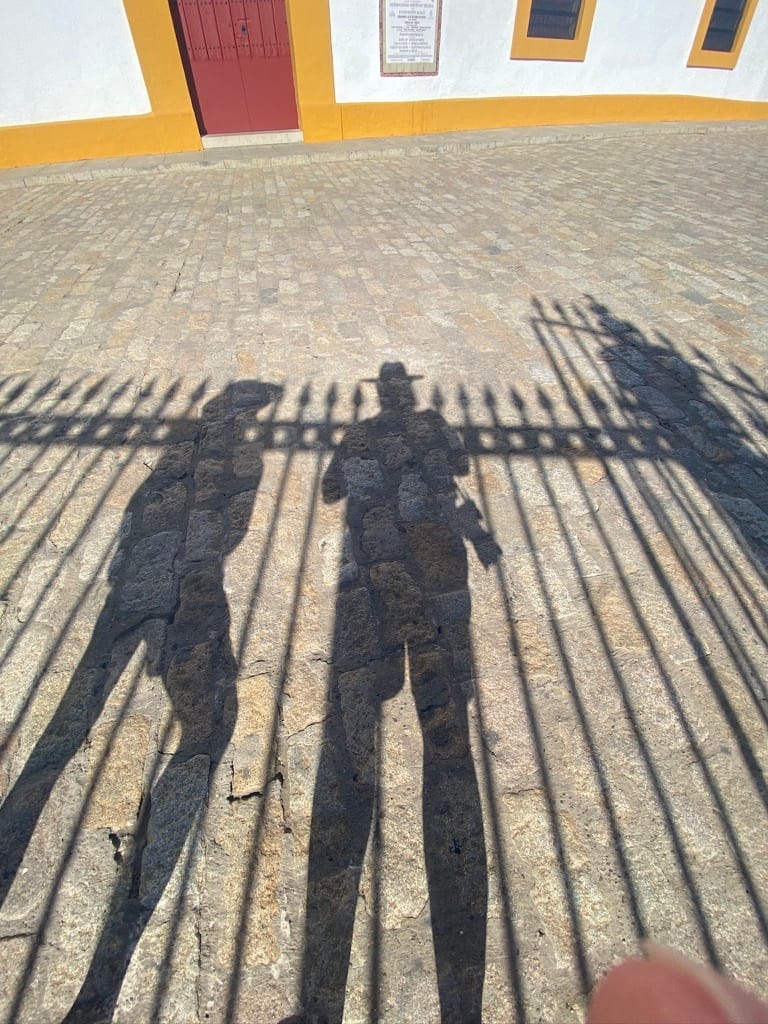
Don’t forget to take the time to have empathy with yourself!
What stories do you have where you’ve used empathy while traveling? I’d love to hear your thoughts.
Q&A: How can employers use empathy to flip their mentality about Gen Z from writing them off as "kids these days," to taking responsibility for motivating the next generation of leaders?
Thanks to the reader that sent in this question! Every 15 years or so we go through this upheaval and dismay over “kids today” as a sizable number of the next generation enter the workforce. My advice for employers is to recognize that 1) a generation is defined by someone’s age, not their work ethic so avoid stereotyping, and 2) ask good questions (step 2 of the 5 steps) to learn more about your Gen Z employees and what makes them tick and how that shows up in the workplace.
For example, Gen Z are digital natives and grew up with smartphones and started using social media as teenagers. They also grew up practicing for active shooters at school instead of the tornado and fire drills that Gen X dealt with - those are very different experiences to prepare for and it’s leaving it’s mark. Gen Z hasn’t had the same work opportunities or experiences that older generations had. This is for a number of reasons but the implication is that they aren’t coming into your workplace with as much experience so they need more coaching on what’s expected and how to behave.
Finally, use this conversation time to explore and share what you were like when you were their age. I’m willing to bet you also hoped to be recognized for your brilliance and be promoted quickly. Perhaps you were also settling into your own skin and exploring the joys of being single in a big city or not having to make your bed when your mom told you to.
Generally we have more in common than we do different, we have to take the time to ask the questions and listen to the answers, integrating it into understanding instead of our expectations. Then, we can begin to imagine what it’s like for the other person and communicate accordingly.
Which leads me to another thought - don’t hesitate to share your expectations and what it feels like if they aren’t being met. I still haven’t met anyone who passed mind-reading and Gen Z is no exception.
Listen Up, Leadership!

Did you know that 86% of people that have empathetic leadership in their workplace feel they are able to successfully balance their work and personal life? Compare that to only 40% of people working under the more typical management style.
The difference is this: We all want to be seen and heard. Organizations that take the time to cultivate an empathetic workplace are taking the time to listen to and understand their employees are more likely to have more innovative teams, higher employee retention, and better connections with their customers.
Thank you to Dr. Joey Faucette for a lovely conversation about this very topic!
Give it a listen:
A Question About the Holidays
It’s that time of year. I’d love to hear from you about how you’ve handled tension or conflict during the holidays. It could be with the cousin or uncle you don’t really like because they have different views or trying to decide which family to visit for dinner. What was the situation? How was it handled and what was the outcome? Anything that’d you’d do differently?
I hope you liked this edition.
Please help everyone’s empathy abilities strengthen - pass this newsletter along to someone you know that might also enjoy it. Either forward this email or invite them to subscribe at the click of the button below.
Reading Between the Lines delivers of-the-moment insights into empathy and human behavior; expect practical tips on using the skill of empathy in everyday life and exclusive updates to keep my community close. All on a biweekly basis.

